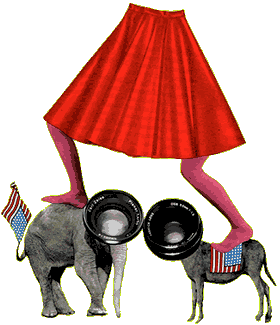
Being perceived by your constituents as "tough on crime" is tantamount to getting reelected these days, and no legislative body is more keenly aware of that than the California State Assembly. From abuse of the elderly to crimes against deaf persons, the Assembly has been presented with literally hundreds of crime bills this year. So if you want to get attention on the floor, you'd better pick a sexy issue -- like women's undergarments.
The crime-fighting superhero on the case is Republican Assemblyman Dick Ackerman. Living in the shadow of The Mouse in Orange County, he's on a personal crusade to stamp out perverts in the Golden State with a new provision aimed at the "video peeping tom." Assembly Bill 182, signed into law by Governor Gray Davis last week, amends Section 647 of the California Penal Code, a law that -- among other things -- prohibits prostitution and glue-sniffing.
Section 647 now includes a ban on the surreptitious photographic practice known as "upskirts," a pastime for sad bastards in trench coats who, well, try to stick cameras up women's skirts. It seems that the issue had leapt from mere annoyance to pressing concern when police arrested a Disneyland customer with an intrusive lens, and the Disney 5-0 couldn't figure out what to charge him with.
It took this writer all of five minutes to find a state law that seems to cover the area. Immediately after Princess Diana's unfortunate accident, State Senator John Burton drew up Senate Bill 262 (which was signed into law in 1998) in order to save any future royalty from death by paparazzi. It already contains specific language about capturing 'the "likeness" (with "visual" equipment) of someone who has "a reasonable expectation of privacy," and allows for monetary damages.
But with thousands of laws to sort through, why bother with research when you can just write a new one? Cops and DAs could draw inference from this law, but that's not as sexy come election time, is it?
And boy, did Ackerman get into it. The LA Times reports that he not only distributed "censored" panty-shots that he had downloaded from Internet porn sites, he built his own little upskirts studio in a handbag and demonstrated his technique in a news conference. The bill gets to the meat of the matter by targeting photography that appears to "gratify the lust, passions and sexual desires." I sure would like to have been there when they drafted that one.
Michael Fleming of the ACLU is not so amused. "AB 182 is a crackdown on a crime that doesn't really exist," he told GettingIt, "and if you look at how the bill is written, it encompasses more than just upskirts. What if you are photographing your girlfriend at Disneyland and you accidentally take someone else's picture and post it on the Internet. Is someone going to come after you?"
Since upskirt culture is largely the provenance of Internet porn, Bill 182 carefully sidesteps the issue of publication and the debate about online censorship. That's fine by John Perry Barlow, founder of the Electronic Frontier Foundation. "It's an invasion of privacy issue, which I am not opposed to," said Barlow. "If the legislation specifically targeted the act of distributing images over the Internet, then I would be opposed. Besides, I need to manage what I can become enraged at these days. There's just not enough time."
It remains to be seen whether AB 182 will stop potential peepers from looking up your dress. Stealth, after all, is part of the jones. Though there are already a number of laws on the books that deal with all kinds of peeping toms, Ackerman seems to have a hit on his hands. The bill passed both the Assembly and the Senate without a hint of opposition -- and Governor Davis, a good Catholic boy, signed it before the ink was dry.
Thanks to the tireless efforts of our men and women in the Capitol, the streets of California are once again safe -- as long as you don't stand over any blustery grates. Hey, wait a minute, somebody call my representative!
Patrick Hughes wears impeccable briefs.
